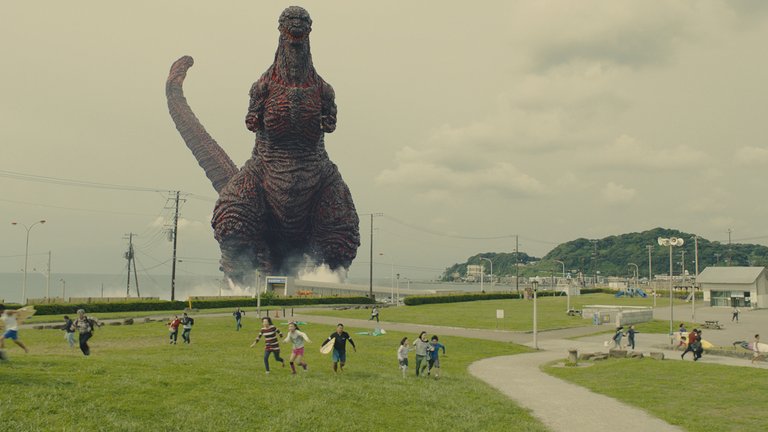
This review may contain spoilers
Hideaki Anno reboots the historical visual metaphor into the modern day with Shin Godzilla; different from 1954's Godzilla, but similar in its attempt to show empathy among humanity. A metaphor for the post-Fukushima Daiichi nuclear disaster and Japan's efforts to deal with the seemingly everlasting threat of nuclear power, in addition to Japan's consistent attempts to remain independent from America, and prove its strength among other nations. Shin Godzilla purposely differentiates itself far from the likes of 2014's Godzilla–an effortless, soulless mess of teasing, lack of meaning, and boredom– by remaining authentic, paying homage to the practical effects and genuine political meanings previously seen over 60 years ago.
Anno's attempt to bring a Japanese Godzilla film into the modern day is nothing short of a success, the way it subtlety tackles political and environmental events in a way in which any person familiar with Japan's recent years may understand is a light reminder of humanity's place on Earth. It is not simply an issue of nationality, but an issue of empathy. Scenes are clearly reminiscent of Japan's 2011 Tōhoku earthquake, which left everyone across the world in shock and disbelief as they observed. Observation is a strong theme in the film, a contrast of Japan resorting to every possible reaction to a threat, keeping public safety in mind, as they avoid aid from overseas at every cost. A sign that Godzilla is not just a giant, evolving lizard from the ocean, but a chance for Japan to get onto their feet and deal with their issues alone. Present or future.
Moving on from the film's themes, Shin Godzilla takes a smart move at remaining entirely political; this film is not about a soldier and his father's 'crazy' beliefs, therefore we see and discover very little about the film's characters; instead we see a collective group in the government tackle the issue, which is completely fine due to the unique style of writing and cinematography. We are not concerned about the characters, but are concerned with what Godzilla may do next to the environment and public, and what extreme attempt to halt him the government will be unleashing next. A cascade of firepower from tanks, Apache helicopters, and bombs are seen in succession as they aim for both Godzilla's legs and head in pure cinematic glory. The film is not afraid to show you Godzilla and his almost demonic look during the action sequences; it takes pride in what has become, which is something Anno has been known to do with his more famous works: the Neon Genesis Evangelion franchise. A franchise with deep spiritual themes in addition to its sheer excellence in alien and mecha design.
The scene in which Godzilla turns into a rage of fire-breathing fury that cloaks an entire city, then slices the surrounding buildings with his atomic breath is enough to make any kaiju fan turn against any other recent film featuring giant monsters and sheer destruction. As stated, this film does not tease. There is no build- up leading to the introduction of Godzilla; he appears; he destroys; he is destroyed.
However, the film's ending gives us an interesting look into the film's metaphor: human-like creatures can be seen frozen in time, erupting from Godzilla's tail. It shows a threat's attempt to evolve into the very thing it is fighting against. A collective of humanoids with the power to match its enemy. Humanity is both the problem and cure.
Really well-executed film. Hope to see some more from the director :)
Check Neon Genesis Evangelion, the two movies that followed and the Rebuild of Evangelion movies. It's rate Shin Godzilla a 9.5/10
For the Evangelion franchise, 10/10 will be an insult. Some people Complain for it being too real in some aspects.